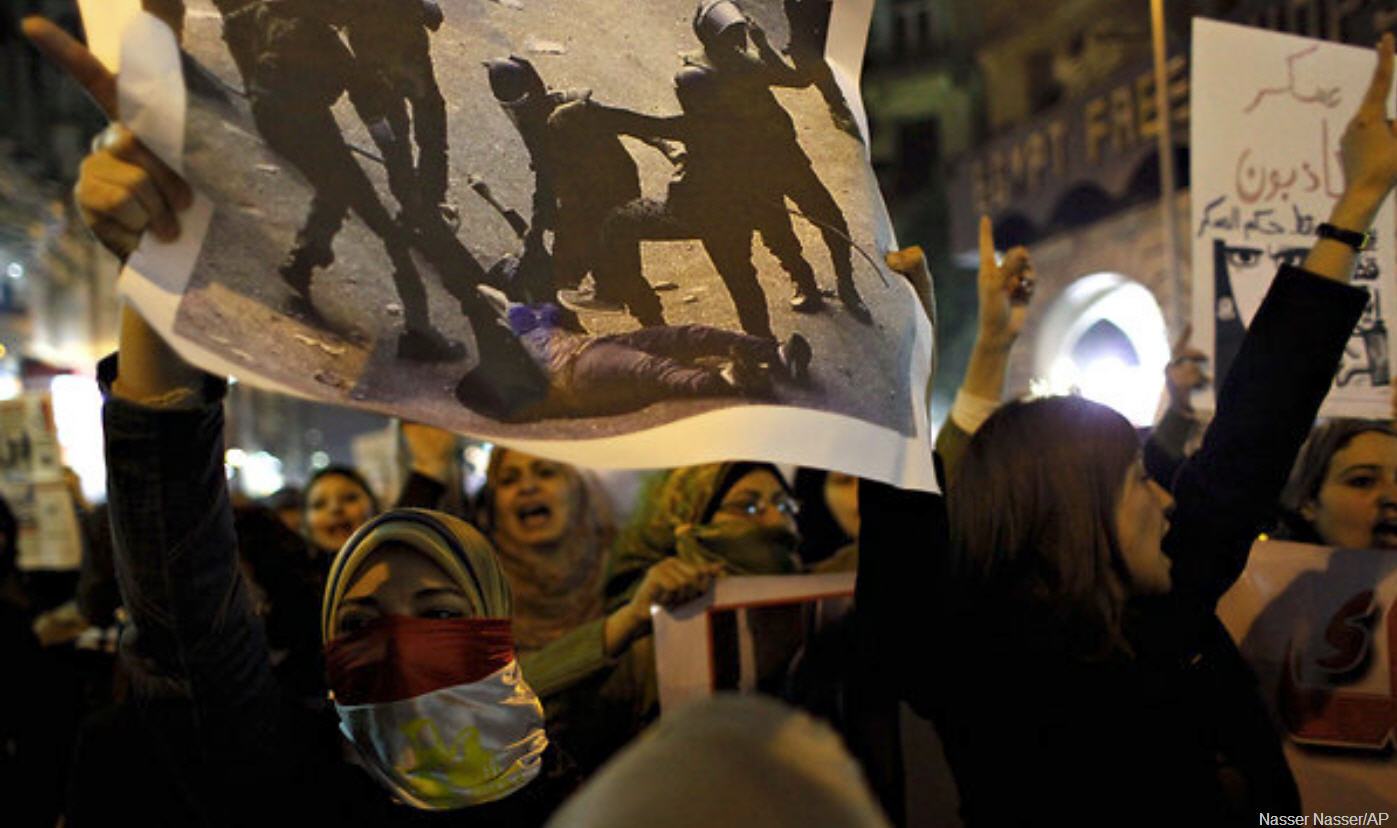 A collaborative network activity such as World Streets needs to find its own best combination of Sir Isaiah Berlin's variant on the Greek parable of the Hedgehog and the Fox ("the fox knows many things, but the hedgehog knows one big thing"). Given the huge information overload with which we live in this highly strung twenty-first century, it is absolutely critical that we play the hedgehog and stick rigorously to our topic. But... at the same time the many sided reality is that our topic by its very nature requires us also to be a fox. Thus are the contradictions and challenges of maturity.
A collaborative network activity such as World Streets needs to find its own best combination of Sir Isaiah Berlin's variant on the Greek parable of the Hedgehog and the Fox ("the fox knows many things, but the hedgehog knows one big thing"). Given the huge information overload with which we live in this highly strung twenty-first century, it is absolutely critical that we play the hedgehog and stick rigorously to our topic. But... at the same time the many sided reality is that our topic by its very nature requires us also to be a fox. Thus are the contradictions and challenges of maturity.
Friday, December 30, 2011
Krugman on Keynes: No time to duck
Man and car: Who is driving whom this morning?
What is it about what the English call a motor car that, when an otherwise perfectly decent human enters it and slams the door shut, somehow there is a  total transformation of that person gripping the stirring wheel into something, into someone who is just a little bit less decent and a little bit less human. A consistent theme of World Streets is that over the last hundred years or so our cars have not only transported us but they have also in the process also transformed us. Oops. And in the process they have fatally (I chose my word) altered the dimensions of the space in which we live our daily lives, and in the same process made this thing that was supposed simply to transport us from A to B at our leisure, into a defining part of our daily lives -- and indeed in some ways part of ourselves. A cruel critic might say, half Faust and half Frankenstein.
total transformation of that person gripping the stirring wheel into something, into someone who is just a little bit less decent and a little bit less human. A consistent theme of World Streets is that over the last hundred years or so our cars have not only transported us but they have also in the process also transformed us. Oops. And in the process they have fatally (I chose my word) altered the dimensions of the space in which we live our daily lives, and in the same process made this thing that was supposed simply to transport us from A to B at our leisure, into a defining part of our daily lives -- and indeed in some ways part of ourselves. A cruel critic might say, half Faust and half Frankenstein.
Tuesday, December 27, 2011
Parks in, Cars not out? Is that going to be our future?
 Michael Kimmelman reports in today's New York Times about the new trend whereby "All around the world, highways are being torn down and waterfronts reclaimed; decades of thinking about cars and cities reversed; new public spaces created." That is certainly good news and true, but there is a bit more to it than that as you will see if you read on.
Michael Kimmelman reports in today's New York Times about the new trend whereby "All around the world, highways are being torn down and waterfronts reclaimed; decades of thinking about cars and cities reversed; new public spaces created." That is certainly good news and true, but there is a bit more to it than that as you will see if you read on.
Saturday, December 24, 2011
Op-Ed: Do you know your ecological footprint?
 Toward the end of each year, I take a few minutes to run my personal Ecological Footprint scan to see if I can get a handle on how I am doing relative to myself, to others and to the planet. Seems like the least I can do, not less because it does oblige me to think about my life pattern and choices in the greater scheme of things. "Walk the talk", etc., etc. (PS. On a more global basis, to get a feel for where the high scores hang out, this map of earth lights at night will provide you with some good clues.)
Toward the end of each year, I take a few minutes to run my personal Ecological Footprint scan to see if I can get a handle on how I am doing relative to myself, to others and to the planet. Seems like the least I can do, not less because it does oblige me to think about my life pattern and choices in the greater scheme of things. "Walk the talk", etc., etc. (PS. On a more global basis, to get a feel for where the high scores hang out, this map of earth lights at night will provide you with some good clues.)
Friday, December 23, 2011
Defining principles: Remembering Mrs. Jacobs
 As we move ahead with the Safe Streets project over the course of the year ahead, there will be a small group of people to whom we shall be referring from time to time who have, through their insights and contributions, basically redefined the entire field of transport in cities. And Mrs. Jane Jacobs is of course one of this wonderful group. We are honored to be able to share these leadership profiles with you, and for Mrs. Jacobs we pass the word to Michael Mehaffy who reminds us of her contributions and takes on her critics head-on.
As we move ahead with the Safe Streets project over the course of the year ahead, there will be a small group of people to whom we shall be referring from time to time who have, through their insights and contributions, basically redefined the entire field of transport in cities. And Mrs. Jane Jacobs is of course one of this wonderful group. We are honored to be able to share these leadership profiles with you, and for Mrs. Jacobs we pass the word to Michael Mehaffy who reminds us of her contributions and takes on her critics head-on.
Wednesday, December 21, 2011
La femme est l'avenir de l'homme
The French poet Louis Aragon told us some two generations ago that "Woman is the future of man". And if we had any doubts about that as we enter into 2012, we have today before our eyes this exceptional, moving photograph of a street demonstration yesterday in which several thousand brave women marched through central Cairo in an extraordinary expression of anger over images of soldiers beating, stripping and kicking female demonstrators in Tahrir Square. --> Read on:
Tuesday, December 20, 2011
Safe Streets defining principles: Remembering Donald Appleyard
Safe Streets is a collaborative worldwide project which will aggressively 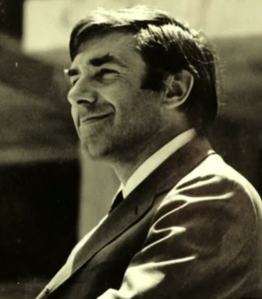 network over the whole of 2012 in our search for shaping ideas with some of the leading thinkers, groups and programs in the field , looking to the future but also not forgetting the past -- including drawing attention to the defining contributions of a certain number of leading thinkers. teachers, writers and sustainability activists, who are no longer with us but who through their work have laid down some of the most important principles which we now need to recall and take into account as we move to create a broad common framework for sustainable streets all over the world. For those of you who do not already know about the formidable vision and work of Donald Appleyard, we have pulled together a collection of reference points that should give you a good first introduction, and at the end of this piece some additional reference materials for those wishing to go further (as indeed you should).
network over the whole of 2012 in our search for shaping ideas with some of the leading thinkers, groups and programs in the field , looking to the future but also not forgetting the past -- including drawing attention to the defining contributions of a certain number of leading thinkers. teachers, writers and sustainability activists, who are no longer with us but who through their work have laid down some of the most important principles which we now need to recall and take into account as we move to create a broad common framework for sustainable streets all over the world. For those of you who do not already know about the formidable vision and work of Donald Appleyard, we have pulled together a collection of reference points that should give you a good first introduction, and at the end of this piece some additional reference materials for those wishing to go further (as indeed you should).
Monday, December 19, 2011
Whitelegg proposes radical overhaul and extension of congestion charge in London.
This report by Professor John Whitelegg scrutinizes the possibilities for developing the existing London congestion charge as a response to concerns about future 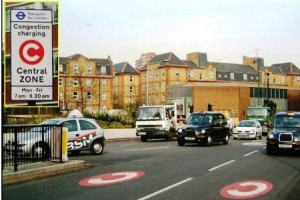 levels of congestion, air pollution and health and economic efficiency. These concerns are important policy considerations at any time but against a background of forecast increases in population and economic activity in the Greater London area they become more important still. World Streets is more than pleased to share this original work with our readers, not less because we take a strong stance against the introduction of technology-based road pricing in cities of the Global South, where it is our view here are more effective ways of achieving the goals of traffic reduction and much-needed new sources of income for public and non-motorised transport. Let's see what John has to say in this timely report from a London perspective.
levels of congestion, air pollution and health and economic efficiency. These concerns are important policy considerations at any time but against a background of forecast increases in population and economic activity in the Greater London area they become more important still. World Streets is more than pleased to share this original work with our readers, not less because we take a strong stance against the introduction of technology-based road pricing in cities of the Global South, where it is our view here are more effective ways of achieving the goals of traffic reduction and much-needed new sources of income for public and non-motorised transport. Let's see what John has to say in this timely report from a London perspective.
What happens in a high-tech Smart City when the lights go out?
 Wouldn't you say that is worth thinking about while you are figuring out how to spend the taxpayers money for safe streets?
Wouldn't you say that is worth thinking about while you are figuring out how to spend the taxpayers money for safe streets?
Thursday, December 15, 2011
Geetam Tiwari on Pro-Poor Green Urban Transport
In this ten minute video Professor Tiwari takes a useful step back from the usual pure transport and all too often dominant technology/infrastructure perspective, taking us back for starters to the fundamentals of what is going on at the level of city dynamics and the daily lives of the vast. of the neglected great majority of all who live and need to get around in the cities in her great and sprawling country. She comes down hard on past policies that have heavily favored the well to do, while all too systematically ignoring the daily needs of the rest. And that of course is unsustainable. Let's listen to what she has to say:
World City Modal Split Database: An invitation
 This open project from EPOMM -- the European Platform on Mobility Management -- is an absolutely brilliant idea. It does not require much explanation to get started; you can be off and going if you simply to click here and dig into their Google map. That said, a few words of introduction may not be altogether without their use to help you take full advantage of their good work.
This open project from EPOMM -- the European Platform on Mobility Management -- is an absolutely brilliant idea. It does not require much explanation to get started; you can be off and going if you simply to click here and dig into their Google map. That said, a few words of introduction may not be altogether without their use to help you take full advantage of their good work.
Wednesday, December 14, 2011
Report on 2011 Urban Mobility India Conference
 Report for India Streets by Vidyadhar Date, Mumbai
Report for India Streets by Vidyadhar Date, Mumbai
The fourth annual Urban Mobility India conference organised in Delhi from December 3 to 6 by the ministry of urban development was no doubt a useful exercise. It did well to give more focus on bicycles and public transport than the previous conference. But the venue itself was highly inaccessible, difficult to reach even by a private car, leave alone public transport. --> Read on:
Tuesday, December 13, 2011
Man – > Technology – > Speed – > Distance – > Destruction of proximity
This out of control bulimic spiral begins with man's uncontrollable tool-making itch, and from thence ,and unknown to us at the time, to tools which take on transforming lives of their own -- one of which in the 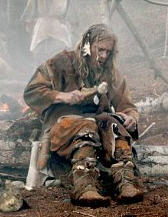 domain of mobility being ever-increasing speed, which in turn leads to ever-increasing distances, and which finally and in largely unnoticed fatal tandem destroys the reality and oh-so important qualities of proximity and community. That's the deal and facing all this is the challenge of this collaborative project for 2012. What we thought was merely more convenient transportation, has snuck up on us and turned into very inconvenient and altogether unanticipated transformation.
domain of mobility being ever-increasing speed, which in turn leads to ever-increasing distances, and which finally and in largely unnoticed fatal tandem destroys the reality and oh-so important qualities of proximity and community. That's the deal and facing all this is the challenge of this collaborative project for 2012. What we thought was merely more convenient transportation, has snuck up on us and turned into very inconvenient and altogether unanticipated transformation.
Saturday, December 10, 2011
Combating the Myth That Complete Streets Are Too Expensive
Tanya Snyder from Streetsblog DC takes a good look at this often-advanced view that, good as they may be for a wide range of reasons, the fact is that we just can't afford complete streets. One more great reason not to change, eh?
Friday, December 9, 2011
Safe Streets 2012 Challenge: Let's take a step back to get some context
 Joel Crawford of Carfree Cities writes:
Joel Crawford of Carfree Cities writes:
"Cities in the modern era have been overrun by cars and trucks. Streets have been stolen from human uses by invasive street users. Not only is this method unlikely to be sustained into the future, it also robs society of some of its most important public spaces. Carfree cities are a delightful solution to many different problems at once." With that, let's have a look at his short film that bangs these points home.
[vimeo http://www.vimeo.com/32922989 w=400&h=225]
Occupy All Streets: The Role of Carfree Cities in a More Sustainable World from J.H. Crawford on Vimeo.
Thursday, December 8, 2011
Safe Streets 2012 Challenge: Is there only one way to skin this cat?
[vimeo http://www.vimeo.com/32958521 w=400&h=225]
Traffic in Frenetic HCMC, Vietnam from Rob Whitworth on Vimeo.
Tuesday, December 6, 2011
The Safe Streets Challenge: 2012 - 2015
After considerable and at times quite contentious discussions over the last  months with colleagues around the world through various discussion fora, social media, programs, conferences and personal visits, we have decided to make one of the principal themes of our work here at World Streets for the coming year that of Safe Streets.
months with colleagues around the world through various discussion fora, social media, programs, conferences and personal visits, we have decided to make one of the principal themes of our work here at World Streets for the coming year that of Safe Streets.
Sunday, December 4, 2011
"I prefer corruption to pollution"
The full message from Todd Edelman -- as part of a discussion on the Sustran/Global South forum of attempts to limit parking in cities through regulation, which  sometimes achieve at least some of their objectives, and at other times risk to open up opportunities for favoritism and corruption --reads: "Briefly (and simplistically): I prefer corruption to pollution." Now I find this a terrific provocative thought and while I leave you to sort that one out for yourself, here's a bit of context on this important, powerful, unambiguous, but nonetheless largely ignored policy issue behind his contentious phrase.
sometimes achieve at least some of their objectives, and at other times risk to open up opportunities for favoritism and corruption --reads: "Briefly (and simplistically): I prefer corruption to pollution." Now I find this a terrific provocative thought and while I leave you to sort that one out for yourself, here's a bit of context on this important, powerful, unambiguous, but nonetheless largely ignored policy issue behind his contentious phrase.
Sunday, November 27, 2011
Missing in action: "Zone 30" in WP in English???
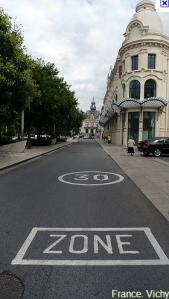 Oops. I have been asked to open the plenary on “Urban mobility: Achieving social efficiency” at next week's Smart Cities conference in Barcelona (full details on which available here , and one of the central themes of the talk is the high importance of taking a strategic approach to slowing down and smoothing traffic in cities. As part of my due diligence I decided to check out the Zone 30 and Twenty is Plenty entries in Wikipedia. Where I found to my disappointment: (a) that there was no entry on Zone 30 in English (and if in French, German, Italian and Dutch, not (yet) in Portuguese, Spanish, etc.) and (b) nothing at all on the important Twenty Is Plenty program out of the UK.
Oops. I have been asked to open the plenary on “Urban mobility: Achieving social efficiency” at next week's Smart Cities conference in Barcelona (full details on which available here , and one of the central themes of the talk is the high importance of taking a strategic approach to slowing down and smoothing traffic in cities. As part of my due diligence I decided to check out the Zone 30 and Twenty is Plenty entries in Wikipedia. Where I found to my disappointment: (a) that there was no entry on Zone 30 in English (and if in French, German, Italian and Dutch, not (yet) in Portuguese, Spanish, etc.) and (b) nothing at all on the important Twenty Is Plenty program out of the UK.
Thursday, November 24, 2011
The New Mobility Agenda gets a hearing in Barcelona with a "Come argue with me" session
This is to invite you to "attend" at least part of a session of a conference that is to take place next week in Barcelona on the topic of "Smart Cities". You can find  full information on the conference here, along with links to all working papers and videos that will be presented over the four days The particular bit I would like to point you to is my keynote talk and challenge which opens the plenary on "Urban mobility: Achieving social efficiency". A full set of working notes and background materials for my presentation is available here. As you will note I have serious reservations about pushing the concept of a "smart city", which to my mind is a pretty loaded phrase, complete with tandem mindset. I invite your comments and critical remarks on any of the points that appear here, and I shall try to deal with them as possible. Thanks in advance. The final talk will be available on video, as will the presentations for all the speakers in this interesting session.
full information on the conference here, along with links to all working papers and videos that will be presented over the four days The particular bit I would like to point you to is my keynote talk and challenge which opens the plenary on "Urban mobility: Achieving social efficiency". A full set of working notes and background materials for my presentation is available here. As you will note I have serious reservations about pushing the concept of a "smart city", which to my mind is a pretty loaded phrase, complete with tandem mindset. I invite your comments and critical remarks on any of the points that appear here, and I shall try to deal with them as possible. Thanks in advance. The final talk will be available on video, as will the presentations for all the speakers in this interesting session.
Wednesday, November 23, 2011
Carsharing competition heats up (and you better watch out)
Paris, France. 19 Mar 2001 8:00 AM
Spring came fast that year at the New Mobility shop in Paris; we were working under pressure to muster world-wide support for the first-ever "Earth Car Free Day" due for 19 April, which we were organizing with a team from
 the Earth Day Network. As part of this effort, we wrote a series of articles that appeared in the lively Grist e-mag exploring some less known new mobility concepts and strategies , which you can see here. And of these the most widely read had to do with carsharing and a gentleman from the Mafia. [Please be sure you read Paul Minett's take-no-prisoners comment at the end of this piece.]
--> Read on:
the Earth Day Network. As part of this effort, we wrote a series of articles that appeared in the lively Grist e-mag exploring some less known new mobility concepts and strategies , which you can see here. And of these the most widely read had to do with carsharing and a gentleman from the Mafia. [Please be sure you read Paul Minett's take-no-prisoners comment at the end of this piece.]
--> Read on:
Saturday, November 19, 2011
Weekend musing: The bicycle helmet rears its ugly head
Under our World City Bike program we have for several years now been looking at the yes/no sudden-death helmet issue in the context of public bike projects .  If you click here you will find several postings that make an effort to report in a balanced manner (to the extent possible) on the issues, trade-offs and implications of creating legal requirements that force all cyclists to use helmets. An absolutely well-intentioned position which has turned out to be no less than the cold hand of death strangling nascent public bicycle projects in various projects around the world. Pity to spend all that public money on a nice bike sharing system and then find that they are not being widely used while honest citizens add pounds of fat to what should be their lithe frames. In the event, here are a handful of short videos from YouTube that take a pretty good whack at it from several perspectives. Have a look and decide for yourself.
If you click here you will find several postings that make an effort to report in a balanced manner (to the extent possible) on the issues, trade-offs and implications of creating legal requirements that force all cyclists to use helmets. An absolutely well-intentioned position which has turned out to be no less than the cold hand of death strangling nascent public bicycle projects in various projects around the world. Pity to spend all that public money on a nice bike sharing system and then find that they are not being widely used while honest citizens add pounds of fat to what should be their lithe frames. In the event, here are a handful of short videos from YouTube that take a pretty good whack at it from several perspectives. Have a look and decide for yourself.
Thursday, November 17, 2011
More on public, private and social space. Andrew Curry reports from occupied London - Part II
Hopefully we have learned at least one hard lesson of life, and that is that a crisis is a terrible thing to waste. And here right before our eyes we have a case in point with the  Occupy movements that are sweeping Europe and North America, a public crisis that is most unexpectedly taking place on "public land". And then suddenly, with no advance notice, everything starts to morph and the issues involved start to encompass not only the continuing unchecked egregious abuses of the financial community but also important (for democracy) issues of public space -- one of our consistent concerns here at World Streets. So in an effort to make sure that we do not miss the opportunity behind this crisis, we pass the word back to Andrew Curry so that he can build further on his article under this title earlier this week
Occupy movements that are sweeping Europe and North America, a public crisis that is most unexpectedly taking place on "public land". And then suddenly, with no advance notice, everything starts to morph and the issues involved start to encompass not only the continuing unchecked egregious abuses of the financial community but also important (for democracy) issues of public space -- one of our consistent concerns here at World Streets. So in an effort to make sure that we do not miss the opportunity behind this crisis, we pass the word back to Andrew Curry so that he can build further on his article under this title earlier this week
Tuesday, November 15, 2011
World Transport Policy & Practice – Vol. 17, No. 3
The Journal of World Transport Policy and Practice is the long-standing idea and print partner of World Streets and the New Mobility Agenda since 1995.  The Autumn 2011 edition appears with articles by Theo Haris, Michelle Zeibots and John Elliott, and Peter Newman and Jeff Kenworthy. In the article that follows you will find the hard-hitting lead editorial by founding editor John Whitelegg. (For a more complete introduction to World Transport click here.)
The Autumn 2011 edition appears with articles by Theo Haris, Michelle Zeibots and John Elliott, and Peter Newman and Jeff Kenworthy. In the article that follows you will find the hard-hitting lead editorial by founding editor John Whitelegg. (For a more complete introduction to World Transport click here.)
- - - > To obtain your copy of WTPP 17/3 click here.
--> Read on:Monday, November 14, 2011
More on public, private and social space. Dispatch from Andrew Curry reporting from occupied London
We think quite a lot about space here at World Streets, from at least two perspectives. First and naturally enough given that the goal of  transportation/mobility/access is specifically to find ways to bridge space, in one way or another, and for better or for worse. And second, because when we get to cities, and given the bulimic, gorging nature of our present dominant transportation options, space starts to get in very short supply (the so-called elephant in the bedroom syndrome). But it is not just space per se; no less important is the quality of public and social space in cities that is (or at least should be) a continuing concern of policy makers and citizens alike. So when we spotted a thoughtful piece such as Andrew Curry's short article that follows, we are glad to be able to share it with our readers.
transportation/mobility/access is specifically to find ways to bridge space, in one way or another, and for better or for worse. And second, because when we get to cities, and given the bulimic, gorging nature of our present dominant transportation options, space starts to get in very short supply (the so-called elephant in the bedroom syndrome). But it is not just space per se; no less important is the quality of public and social space in cities that is (or at least should be) a continuing concern of policy makers and citizens alike. So when we spotted a thoughtful piece such as Andrew Curry's short article that follows, we are glad to be able to share it with our readers.
Saturday, November 12, 2011
Musing: What do you get if you use an iPad to access World Streets?
An iPad is not a PC, for a number of reasons. Always on, always near, always 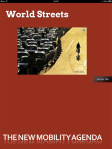 open, it provides the user with an entirely different and far more personal 21st century interface with the Internet and its extensions. So for this reason we decided to give a bit of attention to seeing how it might be useful to retrofit World Streets so that it provides a friendlier and more creative source for those deciding to come in via iPad or similar tablet technology. We shall look into this more analytically in the coming weeks; however for this weekend day let us simply invite you to point your iPad to us and tell us what you think.
open, it provides the user with an entirely different and far more personal 21st century interface with the Internet and its extensions. So for this reason we decided to give a bit of attention to seeing how it might be useful to retrofit World Streets so that it provides a friendlier and more creative source for those deciding to come in via iPad or similar tablet technology. We shall look into this more analytically in the coming weeks; however for this weekend day let us simply invite you to point your iPad to us and tell us what you think.
Friday, November 11, 2011
The Battle for the Street: Who won? Who lost? What next?
[Have a look at this good historical piece by Christopher Gray which appeared in today's New York Times under their Streetscapes/Traffic Wars rubric.]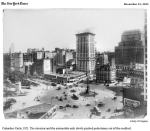 IN the future, perhaps our time will be known as the first decade of the Bicycle Wars, with righteous armies fighting over traffic lanes, bike paths and sidewalks, indeed over the very purpose of the streets themselves. Like many wars, it’s a question of territory, and the pedestrian has been losing for years.
IN the future, perhaps our time will be known as the first decade of the Bicycle Wars, with righteous armies fighting over traffic lanes, bike paths and sidewalks, indeed over the very purpose of the streets themselves. Like many wars, it’s a question of territory, and the pedestrian has been losing for years.
Thursday, November 10, 2011
Readers' Choice. "Top Twenty", 2011
When we post an article in World Streets, as we do on most weekday mornings, we are always extremely careful about our selection of topic and the manner in which  we present it for our busy readers. But once the day's feature has its hours of front page glory and takes its place in our ever-expanding database, which at this point consists of more than a thousand original pieces by more than a hundred no less original collaborators worldwide, it often comes as a surprise to us which postings turn out to get most attention from our readers. Which article is going to have several thousands of readers, and which just a trickle? Fortunately, life in the twenty-first century being what it is, we are able to track readership and are now able to share with you this listing of the "top twenty" articles consulted here over 2011. To me this listing is nothing if not surprising, but let me get out of the way here so you can go at it yourself.
we present it for our busy readers. But once the day's feature has its hours of front page glory and takes its place in our ever-expanding database, which at this point consists of more than a thousand original pieces by more than a hundred no less original collaborators worldwide, it often comes as a surprise to us which postings turn out to get most attention from our readers. Which article is going to have several thousands of readers, and which just a trickle? Fortunately, life in the twenty-first century being what it is, we are able to track readership and are now able to share with you this listing of the "top twenty" articles consulted here over 2011. To me this listing is nothing if not surprising, but let me get out of the way here so you can go at it yourself.
Tuesday, November 8, 2011
Getting the most out of World Streets: Stocks and flows
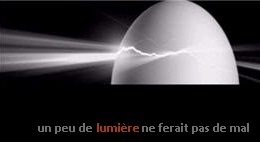 As they put it in Economics 101 what you find here under this double-barrelled name functions both as a flow and as a stock. The "flow" component is basically the articles that appear here each week day on average, plus the abundant collection of related social media and discussion fora which variously stream in to and out of the flow.
As they put it in Economics 101 what you find here under this double-barrelled name functions both as a flow and as a stock. The "flow" component is basically the articles that appear here each week day on average, plus the abundant collection of related social media and discussion fora which variously stream in to and out of the flow.
The "stock" is a considerable base of resources which have been collected here through the extensive international work of the New Mobility Agenda in our assigned field over more than a decade. In the present website you will see them listed for the most part in your left-hand column, and since they are both extensive and useful it seems like a useful idea to explain it briefly. Let's take it from the top.
Monday, November 7, 2011
CarSharing: A 1% solution (And why it is a critical 1%)
The learning process has been long and painful. But it is almost 2012, the results are in, and we now know this one thing for sure: There are no one single,  mega-dollar, build-it, big bang, fix-it solutions for transportation systems reform. No, the process is far more complex than that. Successful 21st century transport policy depends on the coordination and integration of large numbers of, for the most part, often quite small things. Small perhaps in themselves, one by one, but when you put all these small things together you start to get the new and far better transportation systems that we need and deserve. Large numbers of small things, each doing their part in concert. We call them "one percent solutions". And carsharing is part of that complex process.
mega-dollar, build-it, big bang, fix-it solutions for transportation systems reform. No, the process is far more complex than that. Successful 21st century transport policy depends on the coordination and integration of large numbers of, for the most part, often quite small things. Small perhaps in themselves, one by one, but when you put all these small things together you start to get the new and far better transportation systems that we need and deserve. Large numbers of small things, each doing their part in concert. We call them "one percent solutions". And carsharing is part of that complex process.
Friday, November 4, 2011
Rethinking Car Free Days in Taipei: Part II
Upon my return to Paris after a ten-day stint in Taiwan working with local colleagues in support of several on-going collaborative city projects there, and in particular in support of this year's 10th anniversary Car Free Day program in Taipei City, I received the following letter from the Commissioner of  Transportation commenting on their follow-up and plans for the year ahead. (Note: For the first part of this report, click here.) It is highly satisfying to see this steady expansion and achievement when it comes to innovation in support of more people-oriented initiatives and services. If you are looking for a good example from Asia, we suggest that you consider putting Taipei on your list.
Transportation commenting on their follow-up and plans for the year ahead. (Note: For the first part of this report, click here.) It is highly satisfying to see this steady expansion and achievement when it comes to innovation in support of more people-oriented initiatives and services. If you are looking for a good example from Asia, we suggest that you consider putting Taipei on your list.
Thursday, November 3, 2011
P2P Carsharing galloping ahead in the USA
As we have seen in a certain number of articles over the last year or so -- click here to review -- the totally unexpected dark horse of carsharing which has  emerged and is presently galloping with surprising speed in quite a number of places around the world is the concept of peer-to-peer (think do-it-yourself) carsharing. Here is a good resume of the present state of play of P2P in the United States that has just appeared in a popular American newspaper. And since carsharing. is a critical components of the overall sustainable transportation package for cities -- you can bet on it! -- there is good reason to stay on top of that if you are a decision-maker, entrepreneur, competitor or source of counsel in our sector.
emerged and is presently galloping with surprising speed in quite a number of places around the world is the concept of peer-to-peer (think do-it-yourself) carsharing. Here is a good resume of the present state of play of P2P in the United States that has just appeared in a popular American newspaper. And since carsharing. is a critical components of the overall sustainable transportation package for cities -- you can bet on it! -- there is good reason to stay on top of that if you are a decision-maker, entrepreneur, competitor or source of counsel in our sector.
Wednesday, November 2, 2011
Sustainability and Equity: A Better Future for All?
Today we step back and look beyond our usual sectoral concerns, and consider  what this important report from the UNDP released today may or may not offer to help us to understand in our up-hill push to sustainable transport and sustainable cities. At first glance, their linking of sustainability and equality as their main theme this year is right in line with our own policy focus. So let's have a look to see what lessons we might learn from their work and perceptions.
what this important report from the UNDP released today may or may not offer to help us to understand in our up-hill push to sustainable transport and sustainable cities. At first glance, their linking of sustainability and equality as their main theme this year is right in line with our own policy focus. So let's have a look to see what lessons we might learn from their work and perceptions.
Op-Ed: A divine solution for Car Free Days?
One of the sayings we use most often at World Streets is one that goes "you can never tell where the next good idea is going to come from". Here is an example. As some of our readers certainly know, we have something of an affinity with the concept of Car Free Days -- which we nonetheless attempt to qualify with ample doses of realism and critical thinking (often sadly lacking). So as luck would have it we end up being something of a worldwide turnstile for news and views about how this or that concept of taking a few cars off the streets of the city and thinking about it for a day is treated in different places. Sometimes this can bring surprises.
As some of our readers certainly know, we have something of an affinity with the concept of Car Free Days -- which we nonetheless attempt to qualify with ample doses of realism and critical thinking (often sadly lacking). So as luck would have it we end up being something of a worldwide turnstile for news and views about how this or that concept of taking a few cars off the streets of the city and thinking about it for a day is treated in different places. Sometimes this can bring surprises.
Tuesday, November 1, 2011
@World Carshare Inventory - 2011/12 Update
Paris, 1 November 2011
Dear World Carshare Colleagues and others who may be interested,
We are currently updating the several sites and sources that together constitute the World Carshare Consortium (see below). It's about time. If you go to our
 original program site in support of carsharing at www.worldcarshare.com, which first saw the light of day back in August 1999, you will see quite a cornucopia of information and sources, some of which still current and useful, and others of which starting to look a bit tired and needing either a major overhaul or quick trip to the trash basket.
--> Read on:
original program site in support of carsharing at www.worldcarshare.com, which first saw the light of day back in August 1999, you will see quite a cornucopia of information and sources, some of which still current and useful, and others of which starting to look a bit tired and needing either a major overhaul or quick trip to the trash basket.
--> Read on:
Monday, October 31, 2011
A Sustainable Transportation Clean Air Media Cornucopia
 From the website of the Clean Air Institute, you have here for your convenient consultation more than 50 audio presentations made during their May 2011 Conference for Sustainable Transportation, Air Quality and Climate Change held in Rosario Argentia. They report that this collection is the largest online collection of audio presentations in Spanish on transportation issues, air quality and climate change. You can access it in Spanish here. And in English, a useable (to us) Google translate version here .
From the website of the Clean Air Institute, you have here for your convenient consultation more than 50 audio presentations made during their May 2011 Conference for Sustainable Transportation, Air Quality and Climate Change held in Rosario Argentia. They report that this collection is the largest online collection of audio presentations in Spanish on transportation issues, air quality and climate change. You can access it in Spanish here. And in English, a useable (to us) Google translate version here .
Friday, October 28, 2011
A Mayor's-Eye View of Sustainable Transportation
The letter that follows is, as you will quickly surmise, not an actual communication from one elected official in one case, but rather a composite, the  distillation of experience that I have had over these last years of trying to push the sustainable transportation agenda in many parts of the world, almost always in conjunction and in dialogue with mayors and other city leaders. As you will see, it is not that they are adverse to or not interested in the concepts behind sustainable transportation and sustainable cities. It is just that they have a great many other things on their mind, including staying on top day after day of the considerable challenges of managing their city -- and, in not very long, running once again for reelection. This is the political reality of which those of us who would be agents of change must be aware, that politics is the art of the possible. Now let's turn the stage over to our mayor:
distillation of experience that I have had over these last years of trying to push the sustainable transportation agenda in many parts of the world, almost always in conjunction and in dialogue with mayors and other city leaders. As you will see, it is not that they are adverse to or not interested in the concepts behind sustainable transportation and sustainable cities. It is just that they have a great many other things on their mind, including staying on top day after day of the considerable challenges of managing their city -- and, in not very long, running once again for reelection. This is the political reality of which those of us who would be agents of change must be aware, that politics is the art of the possible. Now let's turn the stage over to our mayor:
Thursday, October 27, 2011
Common Mobility Cards (Big brother is watching in India too)
A trickle of media reports over the last year or so have been hinting about a new single unified ticketing system or fare collection method being pushed through various big and small cities. That sounds promising, but is there more to it that we should be considering? (Venkatesh Nayak. Access to Information Programme . Commonwealth Human Rights Initiative)
--> Read on:Wednesday, October 26, 2011
Changzhi World Share/Transport Forum II: Opening keynote with Chinese subtitles
We have been asked to post the videoconference keynote address to the second World Share/Transport Forum that took place in Changzhi China from 24-25 October with Chinese subtitles which you will find here. Additional background information on the project follows below.
Tuesday, October 25, 2011
European City Modal Split Database: An invitation
 This open project from EPOMM -- the European Platform on Mobility Management -- is an absolutely brilliant idea. It does not require much explanation to get started; you can be off and going if you simply to click here and dig into their Google map. That said, a few words of introduction may not be altogether without their use to help you take full advantage of their good work.
This open project from EPOMM -- the European Platform on Mobility Management -- is an absolutely brilliant idea. It does not require much explanation to get started; you can be off and going if you simply to click here and dig into their Google map. That said, a few words of introduction may not be altogether without their use to help you take full advantage of their good work.
Monday, October 24, 2011
World Share/Transport Forum II. Changzhi, China
 Changzhi, China. 24 October: The Second World Share/Transport Forum opens in Changzhi today, with the mission of looking into the concept of Share/Transport for selective adaptation, application and extension in Chinese cities. The Forum is supported by a collaborative effort led by the China Urban Transport Development Strategy and Partnership Demonstration Project (CUTPP): National Development and Reform Commission, the World Bank and the Global Environment Facility (GEF). It builds on and extends the pioneering work on share/transport initiated by the international team who laid the base for the first World Forum that was convened in Kaohsiung Taiwan in September 2010.
Changzhi, China. 24 October: The Second World Share/Transport Forum opens in Changzhi today, with the mission of looking into the concept of Share/Transport for selective adaptation, application and extension in Chinese cities. The Forum is supported by a collaborative effort led by the China Urban Transport Development Strategy and Partnership Demonstration Project (CUTPP): National Development and Reform Commission, the World Bank and the Global Environment Facility (GEF). It builds on and extends the pioneering work on share/transport initiated by the international team who laid the base for the first World Forum that was convened in Kaohsiung Taiwan in September 2010.
Saturday, October 22, 2011
Friday, October 21, 2011
Welcome to TEMS - The European City Modal Split Database
 This article is presently being revised and expanded with the support and inputs of the EPOMM team. Please come back on Monday for the full feature piece.
This article is presently being revised and expanded with the support and inputs of the EPOMM team. Please come back on Monday for the full feature piece.
** Paris, 25 Oct. Click here for full article **
--> Read on:Thursday, October 20, 2011
On "Filtered Permeability" as a sustainability tool
During one of our eternal research and reading probes which had us looking at and weighing the advantages, etc., of the many diverse approaches to creating "Livable Streets" (my favorite that being the term of the great and much missed Donald Appleyard), "Complete Streets", "Quiet Streets", "Fused Grids" . . . (just to cite a few of their many names"), we tumbled onto a phrase "Filtered Permeability" which was altogether new to us. After a bit we identified the person who had coined it, Steve Melia of the University of the West of England, and asked him to fill us in:
--> Read on:Saturday, October 15, 2011
Friday, October 14, 2011
Public audit and transport budget transparency: Pune India
Parisar is a civil society organization in Pune India working on lobbying and  advocacy for sustainable development. Its work focuses mainly on sustainable urban transport, since it recognizes that unsustainable transport policies and systems are the foremost threat to urban environment and quality of life. This article, kindly shared with us by their blog team at http://www.parisar.org/, reports on an activity the likes of which we would like to see in every city in the world -- a continuing citizen audit of the city's budget, and in particular those aspects that relate to transportation investments and expenditures.
advocacy for sustainable development. Its work focuses mainly on sustainable urban transport, since it recognizes that unsustainable transport policies and systems are the foremost threat to urban environment and quality of life. This article, kindly shared with us by their blog team at http://www.parisar.org/, reports on an activity the likes of which we would like to see in every city in the world -- a continuing citizen audit of the city's budget, and in particular those aspects that relate to transportation investments and expenditures.
Thursday, October 13, 2011
Aw-shucks. GM Blunders onto Campus
Not everything the auto lobby does today is greenwash. There is plenty of that about of course, but in addition the honeyed words that are constantly  articulated to calm our raging democratic spirits and to bring us to believe that we are all in the same side in this one big happy sustainable family, there are occasions in which the industry and its more hapless proponents fall back into a blatant posture of pure meanness of spirit. As an example let us take a look at a recent vicious campaign of General Motors to sell their cars to young people, at any cost to their future well-being.
articulated to calm our raging democratic spirits and to bring us to believe that we are all in the same side in this one big happy sustainable family, there are occasions in which the industry and its more hapless proponents fall back into a blatant posture of pure meanness of spirit. As an example let us take a look at a recent vicious campaign of General Motors to sell their cars to young people, at any cost to their future well-being.
Who read World Streets this morning?
 World Streets makes the claim that it is a truly international journal and world-wide collaborative effort. Anyone can say that, it's an easy claim to make. But just to put some muscle on it here is a map showing the points of origin of the readers who have come in thus far this morning. A day much like any other.
World Streets makes the claim that it is a truly international journal and world-wide collaborative effort. Anyone can say that, it's an easy claim to make. But just to put some muscle on it here is a map showing the points of origin of the readers who have come in thus far this morning. A day much like any other.
Wednesday, October 12, 2011
Rethinking Car Free Days in Taipei City
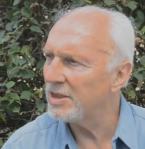 Your editor was kindly invited by Mayor Hau Lung-pin to come to Taipei City this year to discuss preparations for the celebration of the city’s tenth successive Car Free Day -- and as part of this collaborative brainstorming process to draw on my experience of some seventeen years working with this, one hopes, transformative transportation approach in different cities around the world.
Your editor was kindly invited by Mayor Hau Lung-pin to come to Taipei City this year to discuss preparations for the celebration of the city’s tenth successive Car Free Day -- and as part of this collaborative brainstorming process to draw on my experience of some seventeen years working with this, one hopes, transformative transportation approach in different cities around the world.
Tuesday, October 11, 2011
Op-Ed: Universal Access to Bus Rapid Transit: Design, operation, and working with the community
From Tom Rickert, Executive Director, Access Exchange International. USA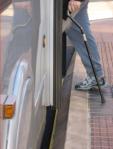 The ability of Bus Rapid Transit systems to serve persons with disabilities in less wealthy countries seemed obvious at first glance. The earliest graphics of BRT trunk lines in Curitiba, Brazil, depicted wheelchair users crossing boarding bridges into articulated buses. Problem solved! Thus, years later, many may be surprised to find cities where wheelchair users are unable to access one or another BRT system.
The ability of Bus Rapid Transit systems to serve persons with disabilities in less wealthy countries seemed obvious at first glance. The earliest graphics of BRT trunk lines in Curitiba, Brazil, depicted wheelchair users crossing boarding bridges into articulated buses. Problem solved! Thus, years later, many may be surprised to find cities where wheelchair users are unable to access one or another BRT system.
Monday, October 10, 2011
A car to improve lives
 What is that famous definition of an intelligent person? Someone who can keep two contradictory ideas in mind without her head exploding? Here is pretty interesting test of this for our more thoughtful anti-car friends. And yes of course, your comments, caveats, etc. are warmly welcome. Let's turn this one around a bit and have a look at it in the cold light of day.
What is that famous definition of an intelligent person? Someone who can keep two contradictory ideas in mind without her head exploding? Here is pretty interesting test of this for our more thoughtful anti-car friends. And yes of course, your comments, caveats, etc. are warmly welcome. Let's turn this one around a bit and have a look at it in the cold light of day.
Thursday, October 6, 2011
Wanted: Group videoconferencing trial participants
A note to readers who may be interested in giving free group videoconferencing a trial run.
We have been using videoconferencing for our international networking on a daily basis since mid-1993, and have always had great difficulty in understanding why these technologies are not being put to more and better use  by our friends and colleagues around the world, especially those with a commitment to sustainable transportation. About every eighteen months (call it a Moore Generation) we find ourselves switching something in terms of hardware or software so as to be able to be more effective in this important part of our overall communications and contact program. We are now on the lip of a new generation and would like to invite you to join us for limited testing and otherwise and laying the base for something that is, I firmly believe, going to be truly useful for us all.
by our friends and colleagues around the world, especially those with a commitment to sustainable transportation. About every eighteen months (call it a Moore Generation) we find ourselves switching something in terms of hardware or software so as to be able to be more effective in this important part of our overall communications and contact program. We are now on the lip of a new generation and would like to invite you to join us for limited testing and otherwise and laying the base for something that is, I firmly believe, going to be truly useful for us all.
